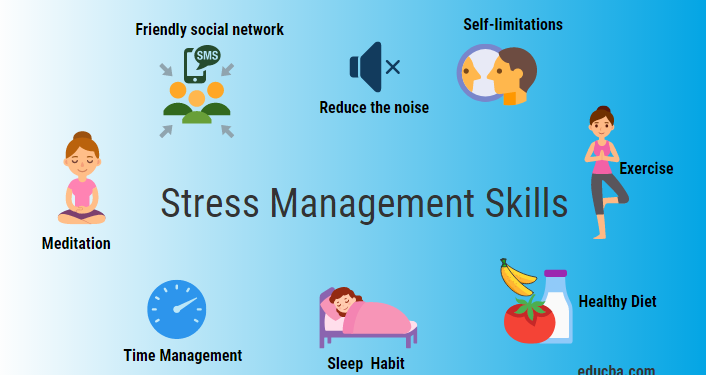In today’s fast-paced world, stress has become an inevitable part of our lives. Whether it’s due to work pressure, personal relationships, or the constant bombardment of information and technology, stress can take a toll on our mental and physical well-being. It’s essential to have effective strategies in place to manage stress and maintain a healthy balance. In this article, we will explore 18 practical and proven techniques for managing stress in everyday life.
Understanding Stress

Before diving into the strategies, let’s briefly understand what stress is and how it affects our health. Stress is a natural response to a perceived threat or change in our environment. It triggers a cascade of physiological and psychological reactions in our body and mind. While some level of stress can be beneficial, chronic or overwhelming stress can have detrimental effects on our overall well-being.
Short-Term Relief Strategies to Manage Stress

Guided Imagery: Taking a Mental Vacation
Guided imagery is a powerful technique that allows us to take a mental vacation and escape the stressors of daily life. By imagining ourselves in a peaceful and serene setting, such as a beach or a forest, we can evoke positive emotions and reduce stress. Guided imagery can be practiced using audio recordings or by creating our own mental imagery. By engaging all our senses and immersing ourselves in the experience, we can achieve a state of relaxation and inner calm.
Deep Breathing: Activating the Rest and Digest Response
Deep breathing is a simple yet effective technique for activating the body’s rest and digest response, which counteracts the fight or flight response triggered by stress. By taking slow, deep breaths and focusing on the sensation of air entering and leaving our body, we can calm our nervous system and reduce stress. The 4-7-8 breathing technique is particularly helpful in this regard. Inhale for a count of four, hold the breath for a count of seven, and exhale for a count of eight.
Progressive Muscle Relaxation: Releasing Tension
Progressive muscle relaxation involves systematically tensing and relaxing different muscle groups in the body to release tension and promote relaxation. Starting from the toes and working our way up to the head, we consciously tense each muscle group for a few seconds before relaxing them completely. This technique helps us become more aware of the physical sensations of stress and teaches us how to let go of tension.
Mindful Living: Cultivating Present-Moment Awareness
Mindfulness is the practice of intentionally paying attention to the present moment without judgment. By cultivating mindfulness in our daily lives, we can reduce stress and enhance our overall well-being. Mindful living involves bringing our full awareness to simple activities such as eating, walking, or even brushing our teeth. By focusing on the sensations, thoughts, and emotions that arise during these activities, we can break free from the cycle of stress and find peace in the present moment.
Read: How to Effectively Manage and Reduce Stress at Work
Long-Term Stress Relief Strategies

Exercise: Boosting Physical and Mental Resilience
Regular physical exercise is not only crucial for our physical health but also plays a significant role in managing stress. Engaging in activities like walking, running, yoga, or strength training helps release endorphins, our body’s natural mood boosters. Exercise also improves sleep quality, reduces anxiety, and enhances overall resilience to stress. Finding a form of exercise that we enjoy and making it a regular part of our routine can have long-term benefits for managing stress.
Balanced Diet: Nourishing Body and Mind
What we eat can have a profound impact on how our body and mind respond to stress. A balanced diet rich in fruits, vegetables, whole grains, lean proteins, and healthy fats provides the necessary nutrients to support our overall well-being. Certain vitamins and minerals, such as vitamins A, B complex, C, and E, play a crucial role in combating stress. By fueling our body with nutritious foods, we can enhance our ability to cope with stress and maintain optimal health.
Social Support: Building Strong Connections
Human beings are social creatures, and having a strong support network is essential for managing stress. Connecting with family, friends, or joining community groups can provide a sense of belonging and support during challenging times. Sharing our thoughts and feelings with trusted individuals can help alleviate stress and provide different perspectives on our problems. Cultivating meaningful relationships and seeking social support when needed can significantly improve our ability to cope with stress.
Leisure Activities: Finding Joy and Relaxation
Engaging in leisure activities that bring us joy and relaxation is an excellent way to counterbalance the stress of daily life. Hobbies, sports, creative pursuits, or simply spending time in nature can provide a much-needed break from our routine and allow us to recharge. These activities promote a sense of fulfillment, reduce stress levels, and improve overall well-being. Making time for leisure activities is vital for maintaining a healthy work-life balance and nurturing our mental and emotional health.
Positive Self-Talk: Cultivating a Supportive Inner Dialogue
The way we talk to ourselves can significantly impact our stress levels. Negative self-talk, self-doubt, and catastrophic thinking only serve to increase stress and anxiety. Cultivating a supportive inner dialogue based on self-compassion and optimism can help us manage stress more effectively. When negative thoughts arise, consciously replace them with positive and empowering statements. By reframing our mindset and practicing positive self-talk, we can build resilience and face challenges with a more optimistic outlook.
Time Management: Prioritizing and Setting Boundaries
Effective time management is crucial for reducing stress and maintaining a sense of control over our lives. Prioritizing tasks, setting boundaries, and learning to say no when necessary can prevent us from becoming overwhelmed by excessive demands. Creating a schedule that allows for breaks, relaxation, and self-care activities is key to managing stress in the long term. By being mindful of how we allocate our time and energy, we can strike a balance between work, personal life, and self-care.
Healthy Sleep Habits: Restoring and Recharging
Adequate sleep is essential for our physical and mental well-being. Chronic sleep deprivation can exacerbate stress and impair our ability to cope effectively. Establishing a consistent sleep routine, creating a sleep-friendly environment, and practicing relaxation techniques before bed can promote better sleep quality. Prioritizing restful sleep allows our body and mind to restore and recharge, enabling us to face daily challenges with greater resilience and clarity.
Cognitive Behavioral Techniques: Changing Thought Patterns
Cognitive-behavioral techniques can help us identify and challenge negative thought patterns that contribute to stress. By examining our automatic thoughts and beliefs, we can gain insight into how they influence our emotions and behavior. Through cognitive restructuring and reframing, we can replace distorted thinking with more rational and positive alternatives. These techniques empower us to manage stress by changing our perception of stressful situations and adopting healthier ways of thinking.
Mindfulness-Based Stress Reduction (MBSR): Integrating Mindfulness into Daily Life
Mindfulness-Based Stress Reduction (MBSR) is a structured program that combines mindfulness meditation, body awareness, and gentle yoga. It teaches individuals how to integrate mindfulness into their daily lives to manage stress more effectively. MBSR has been shown to reduce symptoms of anxiety, depression, and overall psychological distress. By cultivating mindfulness as a way of being, we can develop greater self-awareness, emotional regulation, and resilience in the face of stress.
Conclusion
Managing stress is a lifelong journey that requires ongoing self-care and attention. By incorporating these 18 effective strategies into our daily lives, we can build resilience, reduce stress levels, and enhance our overall well-being. Remember, what works for one person may not work for another, so it’s important to experiment and find the techniques that resonate with us. By proactively managing stress, we can create a healthier and more balanced life for ourselves.


